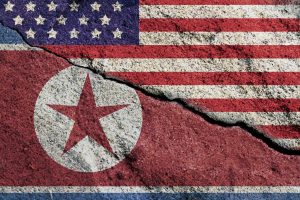Which country do Americans think is the United States’ “greatest enemy”? Russia? Iran? China? If you said any of those, you’d be wrong. According to a recent Gallup poll, a plurality of Americans see North Korea as the greatest threat to the country, overtaking Russia, which took the top spot last year. 16 percent of Americans polled by Gallup said Pyongyang deserved the “greatest enemy” superlative this year. Russia, Iran, and China took honorable mentions with 15, 14, and 12 percent respectively. Overall, 8 percent of Americans view North Korea in favorable terms.
I should note that North Korea topping this year’s ranking shouldn’t be taken as a sign that Americans have grown significantly more fearful of Pyongyang. In 2014 and 2015, North Korea came in at 16 and 15 percent as well. Instead, it seems that North Korea captured a plurality of American anxiety this year due to shifts elsewhere in public perception. Notably, Russia and Iraq yielded three percentage points each. Moreover, Iran shot up this year, gaining five percentage points, taking it from 9 percent in 2015 to 14 percent in 2016. (Curiously, Tehran was tied with Pyongyang at 16 percent in 2014–the dip in 2015 may have been due to the negotiating process over the nuclear deal.)
It’s worth considering why North Korea would end up still topping the list this year. Of course, the date respondents were surveyed for this year’s rating may have bumped up Pyongyang’s place in the rankings. Gallup asked a representative sample of Americans to name their country’s “greatest enemy” between February 3 and February 7, 2016–a month after Pyongyang captured headlines for purportedly testing a hydrogen bomb and, for those polled on February 7, the day of its launch of an earth observation satellite. Overall, however, Gallup notes that 16 percent is the lowest total for a country listed as the “top threat” to the United States since the polling agency started asking the question.
I suspect also that cognitive biases, such as the availability heuristic* and the mere exposure effect, may have skewed results. For example, the recency and headline-grabbing nature of North Korea’s latest nuclear test may have disproportionately captured American imaginations. Of course, there is the legitimate issue of people taking North Korea’s nuclear signaling at face value. North Korea’s belligerent language, including its calls for nuking the U.S. homeland, received popular news coverage. Nuclear weapons are rightfully terrifying and no other country threatens to use them against the U.S. homeland.
* The availability heuristic, which says that people will overestimate the likelihood of something because its shocking or emotional nature makes it more easily “available” in their heads, is certainly at play with American fears about terrorism. For a recent example, consider that in the recently concluded Republican Party primaries in South Carolina, a plurality of voters identified terrorism as their top concern, even though they may be more likely to be killed by a falling piece of furniture. Coverage of gory atrocities by the Islamic State and other groups increases the “availability” of terrorism as a driver of fear.

































